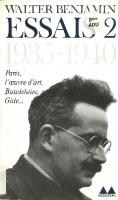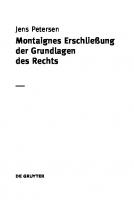Montaigne's Essais 9781003304500, 0048000728
This book, first published in 1987, is an examination of Montaigne’s Essais and a guide to the reading of this fascinati
218 4 134MB
English Pages 210 [211] Year 2022
Cover
Half Title
Title
Copyright
Original Title
Original Copyright
Dedication
Acknowledgements
Contents
Preface
Abbreviations
1 Introduction
(i) Biography
(ii) The 'Living' Text
2 How to Read a Page of Montaigne: Active Participation of the Reader
3 Intellectual and Philosophical Background
(i) Renaissance Humanism
(ii) Stoicism and Epicureanism
4 The 'Apologie de Raimond Sebond': Religion and Scepticism
5 Political and Ethical Ideas
6 The Classical Literary Background: Knowledge and Imagination
7 The Ambiguous Frontier between Prose and Poetry
8 The Study of the Self: Psychology/and Humanity
9 The Art de Vivre: Experience and Aesthetics
10 Montaigne through the Ages
Notes
Select Bibliography
Index
Recommend Papers
File loading please wait...
Citation preview
Routledge Revivals
Montaigne's Essais
This book, first published in 1987, is an examination of ontaigne’s Essais and a guide to the reading of this fascinating, stimulating and imaginative writer – a writer who is also difficult to read and interpret. This book’s aim is to help the reader of ontaigne understand that their own experiences of life and literature can be brought to bear to help comprehend the true meaning of ontaigne.
Montaigne's Essais
Dorothy Gabe Coleman
Routledge (./4)\ i~ J -1)~.,,vt-'-
Taylor&FrancisGroup
First published in 1987 by Allen & Unwin This edition first published in 0 by Routledge 4 Park Square, Milton Park, Abingdon, Oxon, OX14 4RN and by Routledge 605 Third Avenue, New York, NY 10017 Routledge is an imprint of the Taylor & Francis Group, an informa usiness © 1987 Dorothy Gabe Coleman All rights reserved. No part of this book may be reprinted or reproduced or utilised in any form or by any electronic, mechanical, or other means, now known or hereafter invented, including photocopying and recording, or in any information storage or retrieval system, without permission in writing from the publishers. Publisher’s Note The publisher has gone to great lengths to ensure the quality of this reprint but points out that some imperfections in the original copies may be apparent. Disclaimer The publisher has made every effort to trace copyright holders and welcomes correspondence from those they have been unable to contact. A Library of Congress record exists under ISBN: ISBN: 978-1-03 -303 6-0 (hbk) ISBN: 978-1-003-30450-0 (ebk) ISBN: 978-1-03 -303 7-7 (pbk) Book DOI 10.43 4/9781003304500
Montaigne's
Essais
DOROTHY GABE COLEMAN Reader in French Literature in the University of Cambridge and Fellow of New Hall
London ALLEN & UNWIN
Boston Sydney Wellington
© Dorothy Gabe Coleman, 1987 This book is copyright under the Berne Convention. No reproduction without permission. All rights reserved. Allen & Unwin, the academic imprint of Unwin Hyman Ltd PO Box 18, Park Lane, Hemel Hempstead, Herts HP2 4TE, UK 40 Museum Street, London WClA lLU, UK 37/39 Queen Elizabeth Street, London SEl 2QB Allen & Unwin Inc., 8 Winchester Place, Winchester, Mass. 01890, USA Allen & Unwin (Australia) Ltd, 8 Napier Street, North Sydney, NSW 2060, Australia Allen & Unwin (New Zealand) Ltd in association with the Port Nicholson Press Ltd, Private Bag, Wellington, New Zealand First published in I987
British Library Cataloguing in Publication Data Coleman, Dorothy Gabe Montaigne's Essais. 1. Montaigne, Michel de --Criticism and interpretation I. Title PQ1643 844' .3 ISBN 0-04-800072-8
Library of Congress Cataloging-in-Publication Data Coleman, Dorothy Gabe. Montaigne's Essais. (Unwin critical library) Bibliography: p. Includes index. l. Montaigne, Michel de, 1533--1592. Essais. I. Title. II. Series. 86-28669 844' .3 PQ1643.C57 1987 ISBN 0-04-800072-8 (alk. paper) Typeset in 10 on 12 point Plantin Light by Columns, Caversham, Reading and printed in Great Britain by Billing and Sons Limited, London and Worcester
For Odette with love
ACKNOWLEDGEMENTS Acki1owl¢dgem.¢nt~: ~te due, f6t p¢r@$.$1on t.o quote copyright mated~;, to (Jµy, Lee, John Murray and Oxford University Press,.
CONTENTS
Acknowledgements Preface Abbreviations
X1
xv xvii
1 Introduction (i) Biography (ii) The 'Living' Text 2 How to Read a Page of Montaigne: Active Participation of the Reader 3 Intellectual and Philosophical Background (i) Renaissance Humanism (ii) Stoicism and Epicureanism 4 The 'Apologie de Raimond Sebond': Religion and Scepticism 5 Political and Ethical Ideas 6 The Classical Literary Background: Knowledge and Imagination 7 The Ambiguous Frontier between Prose and Poetry 8 The Study of the Self: Psychology/ and Humanity 9 The Art de Vivre: Experience and Aesthetics 10 Montaigne through the Ages
80 99 114 138 158
Notes
175
Select Bibliography
187
Index
190
1 1
7 12 26 26
35
49
66
PREFACE Montaigne is a difficult author but a fascinating, stimulating and imaginative one. Unlike many writers on the Essais I do not find him easy to read, not do I find interpreting him easy. Writers 'explain' his thought and technique, and by so doing fail to observe how much better Montaigne is than they. My aim echoes _Emerson's remark, ' 'Tis the good reader that makes the good book', and the perfect reader realizes that his own experience of life and literature not only helps his understanding of Montaigne but actually is itself enhanced intellectually, emotionally and sensitively through reading Montaigne. Every great work is difficult, and in every true critic there is a disciple. My remarks ate inevitably subjective but they are pushing all the while towards objectivity. I 'sense' Montaigne standing at my shoulder, teasing, humorous and inscrutable; a civilized gentleman, with a sense of human absurdity, but aware, too, of human dignity, founded precisely on our awareness and acceptance of absurdity. Montaigne is perfectly aware of distortion and ambiguity in all human communication - nothing but commentary after commentary in order to try to speak intelligibly - 'nous ne faisons que nous entregfoser'(IIl.13). I quote Cotgrave, whose dictionary has great historical value for the study of French and English, when I am 'trying out' the meaning of a particular word, and Florio, who wrote not a literal translation but who can make Montaigne live in English just as Rabelais lives through the prism of Urquhart, since I think his rendering is particularly apt.
ABBREVIATIONS
Randle Cotgrave, A Dictionarie of the French and English Tongues (London: Adam Islip, 1611) EP Reproduction en phototypie de l'exemplaire avec notes manuscrites margi,nales des Essais de Montaigne appartenant a la ville de Bordeaux, ed. Ferdinand Strowski; 3 vols (Paris: Librairie Hachette, 1912) exemplaire L'Exemplaire de Bordeaux (Paris: Chez Abel L'Angelier, 1588). Montaigne's own copy with manuscript alterations by ·the author himself Florio The Essayes ofMichael Lord ofMontaigne, trans. John Florio (London: Routledge, n.d.) Villey-Saulnier Les Essais de Montaigne, ed. Pierre Villey with a preface by V.-L. Saulnier, 2 vols (Paris: Presses Universitaires de France, 1978) Cotgrave
Note
The. letters (A), (B) and (C), inserted where the information is relevant, refer to the 1580 edition of the Essais, the 1588. edition and the exemplaire version as it appears in Villey and Saulnier's edition. Classical authors are in general quoted from modern editions, but where the quotation is Montaigne's the text of the exemplaire is retained, even when it is at variance with modern editions. The English version used throughout is that of Florio (1553?-1625). Occasionally, the version is my own, and this is followed by the initials 'DGC'.
CHAPTER I
Introduction (i)
BIOGRAPHY
We are all perhaps familiar with the personality of Montaigne as 'fictionalized' by Montaigne in the Essais: a convivial country gentleman with an atrocious memory, a soft and lazy disposition, a slow mind, a tardy faculty of invention and a sluggish apprehensive power (1.26). He paints a picture of an extremely sensitive man, both as regards poetry :('Elle ne pratique nostre jugement; elle le ravit et ravage': I.21) and as regards cruelty (111.8) and the suffering of other human beings ('La veue des angoisses d'autruy m'angoisse materiellement': 1.21). He relishes telling us that radishes were good for him at one period, that they disagreed with his stomach at another and that today they agree with him again (IIl.13); that his eating habits are 'indecents' because he eats 'gouluement' (111.13) and spoil his health and pleasure; that he prefers dinner to lunch, although it is not the meal itself that matters . but the company he eats in (111.13). He delights our fondness for the picturesque with his thick moustache 'Les estroits baisers de la jeunesse, savoureux, gloutons et gluans, s'y colloyent autresfois, et s'y tenoient plusieurs heures apres' (1.55: 'The close-smacking, sweetnesse'-moving, love-alluring, and greedi-smirking kisses of youth, were heretofore wont to sticke on them [mostachoes] many houres after'); with his being a man who, because of his lack of height, preferred to be on horseback; who hated lying and dissimulation; who was rather stubborn and reactionary (111.1 and 4); and who did not suffer fools gladly. He savours giving us an account of his sexual capacity (111.5) or incapacity (1.2), of his gallstones, his old age and the presence within him of two personalities - the mayor of Bordeaux and Michel de Montaigne (111.10) - whom he keeps clearly separate. We are attracted to the portrait and become fascinated by the 'autobiography'. We are like Sainte-Beuve, who said '11 y a du Montaigne en chacun de nous'. But very soon we can find 'untruths' DOI: 10.4324/9781003304500-1
2
Montaigne's Essais
in this 'autobiography': for instance, there seems to be a contradiction between a statement like 'Je n'ay eu guere en maniement que mes affaires' (11.17) a:nd 'En ce peu fay eu a negotier entre nos Princes' (Hl.1). After all, the real Montaigne was indeed an important political figure negotiating with Henri de Navarre, Henri de Guise, Catherine de Medici and Henri Ill; this suggests that the public facts of his life are peripheral to what he wants to do in the Essais. He is not concerned with being a historian of his life in a two-dimensional way. The Essais is neither his Journal nor his Memoires; he never published his own Journal de voyage en ltalie, and it was only in 1774 that it appeared · and shocked the world of the Enlightenment by its sympathique attitude towards the church. The Essais is unique: a combination of fiction and experience which disorients the reader completely. And Montaigne is aware of its uniqueness: at the beginning of 'De l'affection des peres aux enfans' (II.8) some time between 1588 and his death in 1592 he. adcis the words 'Le seul livre au monde de son espece'. Before tasting the 'fictional' Montaigne we shall briefly sum up the factual. events of his life. He was born on 28 February 1533 at the chateau •of Montaigne . in the small hamlet known today as SaintMichel de Montaigne, about fifty miles east of Bordeaux. The round tower still stands with the library (now empty of books) on the second floor where Montaigne wrote his .Essais. From the library windows he could view µie gently sloping hills and plains covered with vineyards. His father, back from fighting in Italy, sent his son to be brought up for about twenty-three months with a humble peasant family, where the first words he spoke would be in a dialect of Perigord; but once home in the chateau they disappeared (as any language or scraps of it will with ·a very young child, if there is no one speaking .it around him). Thanks to a father who had been enlightened on education by Erasmus' treatise De pueris Montaigne •learned Latin before French by the direct method under a German tutor. At the age of 6 he was sent 'to the College de Guyenne in Bordeaux where his teachers - the Scotsman .Buchanan, the fine literary critic Muret, Grouchy, Guillaume Guerente and others - were all Erasmianists. Montaigne's spoken Latin got worse in the college, but - and this is crucial ifwe are to understand the bi-literariness of his writing - he never lost the ability to read Latin or to love the literature of ancient Rome. At Guyenne, he says, he read Ovid first (1.26) because the Metamorphoses was 'most agreeing with my young age' (Florio). May I be allowed to disagree? The solitary reading of Ovid, Virgil, Horace,
Introduction
3
and so on, was bound to awaken his sensualism, his eroticism, his pagan leanings and his passionate nature: he would read in them that no man can win over passions and would discover the physiological nature of sensations around lust, the alternation between fire and ice and the sheer immobility that love creates. Montaigne hated the sempiternal Cicero that he had at school, and this hatred was to last throughout his life. 1 Elie Vinet (1509-87), a humanist of Bordeaux, who became the principal of the College de Guyenne in 1562 and who kept up a close correspondence with Buchanan until his death (letters delivered by Scotsmen who came to Bordeaux for the wine trade), sets out the programme of schooling in the college in the sixteenth century. 2 Montaigne, having been taught Latin before he entered the school, skipped the tenth form where the children were call'ed alphabetaires and the ninth (les aulani) and joined the seventh form where the pupils were taught 'l'art de versifier ainsi que les figures' .3 In the fourth form he was treated to a discourse of Cicero and read the Tristia and the Epistulae ex ponto of Ovid: in the third form he learned of rhetoric, and in the second form he read Virgil and the Pharsalia of Lucan, 'dans les quatre classes superieures et surtout dans la premiere on traite de la rhetorique ... A trois heures, la Poetique, surtout d'apres Virgile, Lucain et Perse, sans oublier Juvenal, Horace et Ovide, mais dans les endroits ou ils respectent les moeurs. ' 4 On 25 August every year the Bordeaux college held a great fete - the Ludovicales - where all the educational work of the year was shown off to the Bordelais people: 'de tous les quartiers de la ville on accourt en foule a ce spectacle' and after 20 September 'on donne conge aux enfants pour les vendanges jusqu'au ler octobre!' This was the school system that Montaigne knew from 1539 until he left in 1546 or 1547. For the following eleven years of his life we do not have any·archival documentation as to his activity, and Montaigne does not tell us of anything in the Essais. The hypothesis of Trinquet that he went to Paris is singularly attractive: the enthusiasm that Montaigne had for the capital city is well known. Jene veux pas oublier cecy, que je ne me mutine jamais tant contre la France que je ne regarde Paris de bon reil: elle a mon carur des mon enfance. Et m'en est advenu comme des choses excellentes: plus j'ay veu depuis d'autres villes belles, plus la beaute de cette-cy peut et gaigne sur mon affection. Je l'ayme par elle mesme, et plus en son estre seul que rechargee de pompe estrangiere. Je l' ayme
4
Montaigne's Essais
tendrement, jusques a ses verrues et a ses taches. Jene suis franfois que par cette grande cite: grande en peuples, grande en felicite de son assiette, mais sur tout grande et incomparable en variete et diversite de commoditez, la gloire de la France, et l'un des plus nobles ornemens du monde. 5 ('De la vanitet, IIl.9; Villey-Saulnier, p. 972: my italics)
I will not forget this, that I can never mutinie so much against Paris but I must needes looke on Paris with a favourable eye: it hath my hart from my infancy, whereof it hath befalne me as of excellent things: the more other faire and stately cities I have seene since, the more hir beauty hath pow;er and doth still usurpingly gaine upon my affection. I love that citie for her own sake, and more in her onely subsisting and owne being then when it is full fraught and embellished with forraine pompe and borrowed garish ornaments: I love so tenderly that even hir spotts, her blemishes and hir warts a.re deare unto me. I am no perfect Frenchman, but by this great matchlesse citie, great in people, great in regard of the felicitie of her situation; but above al, great and incomparable in varietie and diversitie of commodities: the glory of France, and one of the noblest and chiefe ornaments of the world. Trinquet has accumulated reasons for his conjecture - the presence of Turnebus, the illustrious Hellenist for whom Montaigne had enormous admiration, the lectures given by his old teachers, Buchanan and Muret (lectures attended by Ronsard and Du Bellay in 1553), the number of Greek books he owned suggesting a period of further education, and so on - but it is still only a conjecture. We have a document dated October 1557 which supplies the first date of Montaigne as a magistrate in Bordeaux. And towards the end of the same year it is likely that he contracted with La Boetie a friendship/love that was to illuminate his whole life. La Boetie was a legal colleague, a classical scholar and neo-Latin poet, in touch with Ronsard and Du Bellay, Bai'.f and Saint-Gelais. His relationship with Montaigne until his death in 1563 was profound, and his influence on the Essais was important. We know for certain that Montaigne was in Paris for at least seventeen months from 1561 to 1562. This may have been when he knew Turnebus so well that he could say in the
Essais:
comme j'ay veu Adrianus Turnebus, qui, n'ayant faict autre
Introduction
5
profession que des lettres, en laquelle c'estoit, a mon opinion, le plus grand homme qui fut il y a mil' ans, n'avoit toutesfois rien de pedantesque que le port de sa robe, et quelque fa






![Philosophische Kultur. Gesammelte Essais [First ed.]](https://ebin.pub/img/200x200/philosophische-kultur-gesammelte-essais-firstnbsped.jpg)



